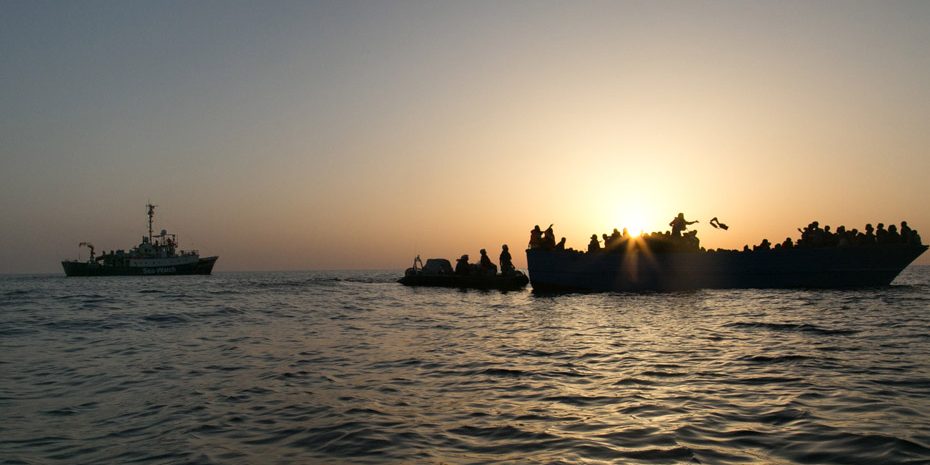A new wind is blowing at Europe’s sea borders. The seizure of the aid ship ‘IUVENTA’ seemed to be the zenith of the escalation of events on the Mediterranean route – until Libya last week threatened to hinder rescue operations by NGOs off its own coast, using violence. Several civil rescue organisations have ended their missions as a result, including Doctors Without Borders (MSF). It is clear that these developments represent a growing threat to people fleeing war and persecution.
International law expert Nora Markard is Junior Professor at the University of Hamburg, where she also leads the Humboldt Law Clinic ‘Fundamental and Human Rights’. In an interview with Sea-Watch, she explains the legal background to the current debate surrounding maritime rescue in the Mediterranean.
The title of your thesis is “War Refugees“. Do all occupants of a rubber boat have the right to be brought to Europe after being rescued from distress, or does that only apply to people with the prospect of gaining asylum status in Europe?
 The question of where people who have been rescued must be disembarked involves two different legal regimes. The first is the regime of so-called ‘international protection’. The protection of refugees according to the 1951 Refugee Convention [RC] falls under this, as does the human right to protection from deportation, which in Europe comes from the European Convention on Human Rights [ECHR]. The other regime is the Law of the Sea.
The question of where people who have been rescued must be disembarked involves two different legal regimes. The first is the regime of so-called ‘international protection’. The protection of refugees according to the 1951 Refugee Convention [RC] falls under this, as does the human right to protection from deportation, which in Europe comes from the European Convention on Human Rights [ECHR]. The other regime is the Law of the Sea.
According to the international law of the sea, ships which have rescued people from distress at sea must bring them to a “safe harbour“. A safe harbour is denoted as such by the fact that the lives and personal safety of those who have been rescued are no longer in danger there. A country of origin, where persecution, torture or degrading treatment threaten, can absolutely not be counted as a safe harbour, nor can a situation where those rescued cannot be adequately provided for.
That means, currently you cannot bring back people to Libya without breaching international law…
The Refugee Convention and the ECHR forbid so-called ‘refoulement‘. According to the RC, a refugee may not be returned to their home country by deportation, or indirectly through “chain deportation” via another state. According to the ECHR, deportation is forbidden to any land where a person – be they a refugee or not – is threatened with grave human rights offences, such as inhuman or degrading treatment or torture. The European Court of Human Rights has ruled that the states which are signatories to the European Convention on Human Rights – which includes all EU member states – are bound by the ECHR on the high seas as well. Moreover, people with a plausible claim of being in danger in the country of destination have a right to a proper procedure to check their claim, along with the corresponding possibilities for legal protection. As a rule, that cannot take place on a ship, so in general they must be brought to Europe in order to check carefully if and when they can be taken to another place, and if so, where that place is.
A state may not therefore bring survivors to Libya after a rescue, for example, because this would be a ‘refoulement’ according to Article 3 of the ECHR. In Libya, refugees and other asylum seekers are, according to reports from NGOS, threatened with serious abuses up to and including torture. Even in the case of other destination states, a state must check carefully for plausible grounds for protection and guarantee asylum or other human rights or subsidiary protection accordingly. Many of these so-called ‘boat people’ are in fact refugees in the legal sense or have a claim to subsidiary protection.
The German government is supporting the EU’s resolution to finance and train the Libyan Coastguard, which continues to return refugee boats to Libya in violation of international law. To what extent is the German government complicit/liable as a result?
Fundamentally, there can of course be no objection to the Libyan Coastguard being trained to maintain higher standards and stop human violations. But this cooperation is dubious in terms of the Coastguard’s active involvement in maritime rescue in the Mediterranean as a way for EU member states to avoid their own obligations under the RC and the ECHR. If the EU member states actively involve the Libyan Coastguard in rescue operations, in view of the current situation in Libya, in the knowledge that those who have been rescued can expect to suffer the gravest human rights violations as a consequence, then they are making themselves complicit.
Italy is negotiating a bilateral agreement with Libya, according to which the Italian navy will, in future, be able to help with the return of boats within the 12 nautical mile zone. Unlike Libya, Italy has ratified the 1951 Refugee Convention. Does this planned agreement not therefore violate international law?
Italy is also bound by international law in Libyan coastal waters, even if the Italian navy is only supporting the Libyan Coastguard. If boats are prevented from leaving the coast, this would violate the human right to leave the country. Italy would then be involved in a way which violates international law. If boats which have already set off are brought back, this is a violation of the prohibition against ‘refoulement’. A bilateral agreement does not change this in any way.
How is it possible in light of an uncertain legal situation, e.g. pullbacks by the Libyan Coastguard, to still enforce human rights?
As soon as states which are signatories to the ECHR are involved, those affected can turn to the European Court of Human Rights. It becomes more difficult if the European states are not exercising direct sovereignty but if only the Libyan Coastguard is active in the area. The European Court of Human Rights has so far not taken a stance on whether it recognises the general prohibition on abetment of human rights violations in the context of the ECHR; this is in any case a particular legal regime which has its own conditions for application. That would be interesting to clarify. For example, violations of the right to leave the country could be clarified before the UN Human Rights Committee, which oversees the UN’s International Covenant on Civil and Political Rights; this also protects the human right to leave any country, including one’s own. The EU Ombudsperson and the EU Fundamental Rights Agency also keep an eye on the human rights situation at the border.
The 1951 Refugee Convention has just turned 66 years old. There are currently more displaced people than ever before. Do we need a reform of international law in order to be able to meet these challenges legally?
I am convinced that we do not need a reform of the RC. It is already in a condition to guarantee protection regardless of changing circumstances. This has been demonstrated in the past 66 years, for example through the recognition of gender-based persecution or the protection of homosexual people. The RC is a post-war instrument; it is certainly not the case that situations of mass flight were unthinkable in 1951. What we need in any case is a mechanism for international sharing of responsibilities. This is only alluded to in the Preamble of the 1951 Refugee Convention, but not outlined in any detail. In any case, it remains to be seen whether the planned Global Compact of the United Nations can make such a mechanism politically binding. Without a mechanism of this kind, states will remain extremely over-burdened in those regions where, after all, 80% of all refugees worldwide remain.
Italy is currently experimenting with new forms of law, for example the Code of Conduct, which is meant to be self-imposed on certain ships in the Mediterranean in addition to the Law of the Sea and international law. Under which conditions may a country [Italy] refuse entry to its ports, as threatened in the negotiations on the Code of Conduct?
A country may not simply refuse entry to a port because it has created its own rules: international law alone is decisive. If a state is responsible for rescue according to the international law of the sea, it cannot invoke a Code of Conduct which it has cobbled together in order to avoid fulfilling its obligations.
Interview: Theresa Leisgang
Translation from German: Sasha Ockenden
Photo credit: Steffen Weigelt











